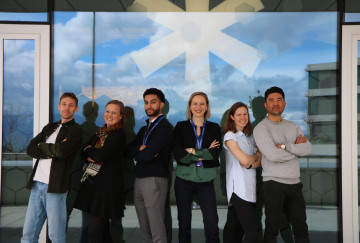CBIG-SCREEN: Improving cervical cancer screening strategy
We met with Professor Marc Bardou from the French National Institute for Health and Medical Research (INSERM), who is leading Horizon 2020 funded project, ‘CBIG-SCREEN’. The project received a €3.66 million award from the prestigious ‘Health, Demographic Change, and Wellbeing’ work program, dedicated to ‘Better health and care, economic growth and sustainable health systems’. CBIG-SCREEN seeks to implement better access and supply of cervical cancer screening to vulnerable groups of women. Catalyze provided an extensive review service for the resubmission of the project proposal, which was granted funding from the June 2020 round.

Current programs underserve vulnerable women
Implementing policy that translates into effective service and accessible resource is a major challenge. For cervical cancer, screening programs provide immense positively impacts, yet under current policies, they remain inaccessible and underused by subpopulations of vulnerable women. In fact, of all cancers, cervical cancer is one of the most effected by socio-economic status, with subpopulations of vulnerable women unable to access, or underusing, screening programs. In Europe, over 61,000 women are diagnosed with cervical cancer each year, with over 26,000 dying from the disease. This relatively high death rate has been attributed to low vaccination coverage and cervical cancer screening rates among vulnerable women. Thus, there is a clear necessity to make screening programs across Europe more equitable, to improve health outcomes and reduce associated healthcare and societal costs.
CBIG-SCREEN seeks better screening strategy
The aim of the CBIG-SCREEN project is to create a Europe-wide knowledge framework about the barriers for cervical cancer screening, and to create policies, programs, communications, and other required actions to effectively service underserved subpopulations of women, with inherent high risk for cervical cancer and low (perceived) access to proper routes of healthcare. Vulnerable subpopulations focused on in CBIG-SCREEN include women of low socio-economic status, women living with HIV or other sexually transmitted diseases, incarcerated women, sex workers and migrants, who may have had no access to screening in their country of origin and now have difficulty.
The impact? Through advancing local, regional or national cancer prevention and/or early diagnostics, CBIG-SCREEN can make significant contributions to alleviating the global cancer burden. With an increase in screening ratios of vulnerable women from 25% to 60%, early identification of high-risk lesions could lead to a reduction of 6,000-7,000 deaths per year.
Co-constructing the policy intervention
Prof. Bardou is prioritizing collaboration with the target group in the CBIG-SCREEN project, in order to co-construct the new policy intervention. Through engaging all stakeholders, in particular the underserved women themselves, the project aims to identify their varied and specific needs, develop strategies around them, and convince policymakers to adopt these strategies. By involving and listening to the women that the project seeks to help, Marc believes his team can develop strategies that convince vulnerable subpopulations of women to partake in cervical cancer screening. Marc described this participatory approach:
“Too many policies are built in a top-down approach. So that means as a scientist you decide what you are going to do, what will be good for the people you want to reach, and then you say, ‘go’! And in fact, most of the time it doesn’t work. The idea [in CBIG-SCREEN] is not only to involve the policy makers, but also to develop the concept of the policy with the end-users, in this case the women.
Marc continued, “I am really trying to build on what is known, and co-construct the intervention with policy makers and women representatives, and then try to make it work in different European country settings.”
Going beyond mass-screening programs
As Marc went on to explain, their approach aims to take a fresh approach, principally of tailored cancer prevention, rather than the previously developed one-size-fits-all strategies that have been unable to reach subpopulations of vulnerable women. “We have many policy options that have been assessed several times always giving the same result. I don’t need to do that again! We need to build a new intervention and tailor it to different settings.”
This means embedding representatives of vulnerable women from each subpopulation into the project, in order ensure the intervention can be effectively tailored to each circumstance. “The diverse circumstances surrounding these women,” Marc said, “require targeted interventions for each subgroup, for example, prison inmates require a different intervention to women living with HIV.”
Learning experiences during the application process
The CBIG-SCREEN proposal was successful on its second submission to Horizon2020. After receiving positive feedback from the first submission, then finding success after resubmitting, we were interested to hear what learning experiences Prof. Bardou had during the process.
“Well, I learned it is difficult to convey the excellence when you are not trying to develop a new, exciting technology.” Marc explained, “When you are just trying to do some implementation research and increase effectiveness of what is already known or implemented. It is tough.”
Catalyze provided a Review Service and completed three reviews of the proposal prior to resubmission. After an initial application in 2019, the resubmission was originally due to be submitted early April, but due to the Covid-19 pandemic, the submission was delayed until June. In this time Catalyze performed another review of the proposal.
“One positive of working with Catalyze was that I learned you need to be very clear on the expected benefits, you cannot be vague. You need to paint a clear picture. So, how many lives will we save? You need to be focused and clear. Give the numerical trends you expect to see assuming the project is successful.”
A successful resubmission
Come the preparation of the resubmission, Marc and his team’s vision for the project had matured, then with extra help from Catalyze, the winning proposal was submitted in June 2020. Prof. Bardou explains how Catalyze’s support helped in the final stages:
“Catalyze was good at improving our description on what is the problem, what is the proportion of vulnerable women in women with cervical cancer. I think your consultants helped us to improve the clarity of the presentation. The way the work packages were represented was really improved. Not only scientifically, but especially graphically improved.”
Win: €3.66 million
Learn about the new Horizon Europe programme



